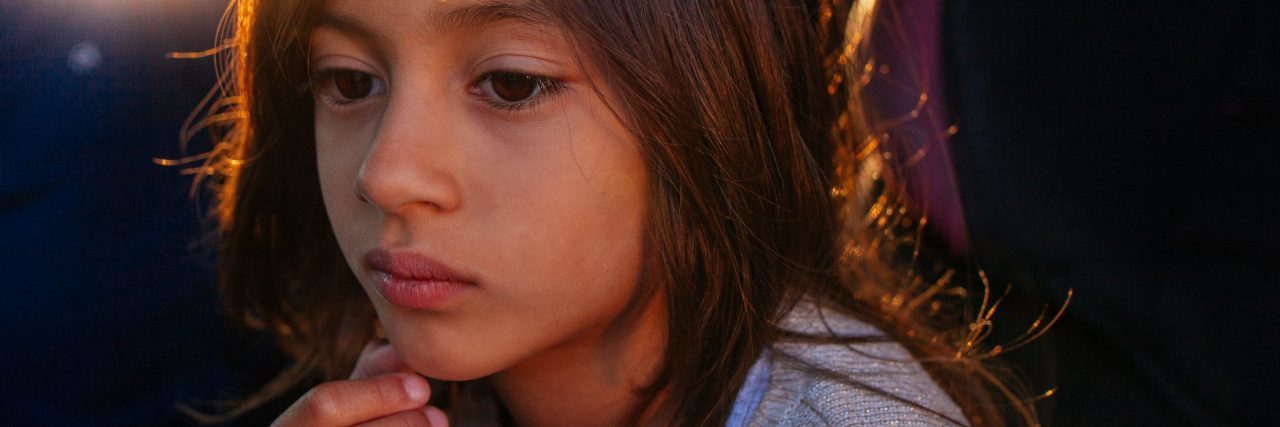Editor’s note: If you struggle with obsessive-compulsive disorder (OCD), the following post could be potentially triggering. You can contact the Crisis Text Line by texting “START” to 741-741. To find help visit International OCD Foundation’s website.
Yes, obsessive-compulsive disorder (OCD) can and does affect children.
I learned about germs in preschool and became terrified of them. My teacher told my mom I was constantly asking if I could go wash my hands. That was the first sign that something seemed off.
At 6 years old, I was holding my mom’s hand as we were crossing the street. All of a sudden, I wriggled free of my mom’s grasp, only to go all the way back across the street and re-cross it without stepping on any cracks or lines. My mom says I “walked in a serpentine pattern.” My parents, who suspected I had OCD, took me to a therapist. The therapist told her it was likely I did have OCD, but she didn’t want to put the diagnosis on me at such a young age. Age 11 was what I call my “nightmare year.” I had no control of my thoughts. I was plagued with torturous thoughts every moment of every day. My own brain seemed to turn on itself. My hands were covered in bloody cracks from washing, washing, washing. I would do somersaults in the pool until I was dizzy. For some reason, I had to do 60 somersaults — no more, no less.
Then, intrusive images of my mom dying flooded my mind. I remember sitting in class and getting hit with images of her being carried away in an ambulance; she was bloody and still. I remember panicking and doing rituals to try to “stop” the thought from coming true. I honestly felt my mom’s life was dependent on my behaviors, even though I knew, logically, that it wasn’t. But logic didn’t matter.
During that same year, I became terrified of my own saliva. I refused to swallow my spit and would hold it in my mouth all day. I walked around school with my cheeks full of spit. It looked like I had just filled my mouth with liquid I hadn’t yet swallowed, except I stayed like that all day. I couldn’t talk (because the spit would drip out). Sometimes, I would find a drinking fountain to spit in to. Eventually, when my mouth got too full, I started spitting into my clothes. I walked around with a saliva-soaked jacket. I didn’t believe I had a choice in the matter — I honestly thought my saliva might be contaminated.
Food was also oftentimes “contaminated.” I used to spit out mouthfuls of chewed food in front of my friends. I didn’t have the energy to care what my peers thought of me. At 11 years old, my weight dropped very low. I looked so sick.
I also worried everyone in the world would disappear except for me. I remember lying in bed every night, calling “mom!” every couple of minutes to make sure she was still there. I got the intrusive thought everyone was a ghost, and I was the only real person alive. I worried about the number eight. The number eight meant I would become pregnant. I was forbidden to “land” on the number eight during rituals. I also developed a fear of becoming possessed.
This was all during my sixth-grade year. I wasn’t learning anything. My teacher said I would just stare at the ceiling all day (she didn’t know I was really counting the holes in the acoustic ceiling tiles). No one knew how to help me. My teachers didn’t know what to do with me. They didn’t understand what was going on.
Every morning, I would just cry. The thoughts would hit me like a ton of bricks right when I woke up.
I would beg my mom to let me stay home. Going to school was exhausting and painful for me. Every task was hard. I felt like I was drowning. I remember lying in my bed one morning and saying, “Mom, I feel like I’m stuck in a nightmare and I can’t wake up.”
I had no idea I needed help. I didn’t know my mind worked differently than everyone else’s. I had experienced intrusive thoughts since age 4 — they were my “normal.” All I knew was I had scary thoughts all the time, and I felt the need to do certain behaviors to keep those thoughts from coming true.
Thankfully, I had wonderful parents who advocated for me and got me connected to an OCD specialist who treated me with exposure and response prevention therapy (ERP). But, many kids don’t the help they need. It’s time we start educating ourselves on the various ways OCD can present itself in our kids and advocate for them, too.
We want to hear your story. Become a Mighty contributor here.
Photo by Joseph Gonzalez on Unsplash

